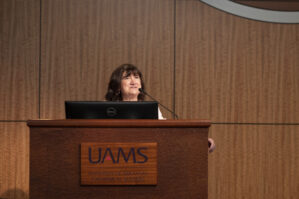By Stephanie Gardner, Pharm.D., Ed.D.
This speech was delivered at the Mehta Awards event.

Good afternoon – I am pleased to welcome you to the awards ceremony for the Drs. Paulette and Jay Mehta Awards in Creative Writing.
This is the second year for these awards, made possible by the generosity of the Mehtas and their love of the arts. These awards speak to their belief in the ability of creativity and the arts to nourish our spirit, to cultivate lifelong learning, and to guide us to becoming better health care providers.
As we find more ways to integrate the arts into health professions education – whether it’s the written word, visual art or music – I believe we are equipping our learners with a powerful tool to help them form deeper connections with patients, maintain joy in medicine and develop empathy and resiliency.
Personally, I love to read. I read for pleasure and to learn. I also enjoy talking about what I am reading and currently belong to two book clubs – including the Provost’s Book Club that I started six years ago. The book club promotes collegiality on campus as we discuss books related to personal and professional development, along with patient care, education or research.
The Mehtas have been avid participants in the annual book club since the start. This year the club read In Shock, by Dr. Rana Awdish, a physician who suffered a catastrophic medical emergency seven months into her first pregnancy that resulted in the death of her unborn child and left her fighting for her own life through massive internal bleeding, septic shock and stroke. She survived the long ordeal but was moved to share her journey due to multiple episodes during her treatment and subsequent return to work where she experienced or observed a shocking callousness or lack of empathy by health providers or colleagues – such as when a nurse tried to guilt her into holding her unborn child’s lifeless body. Through this, she believes it is important for a physician or health provider to acknowledge and empathize with a patient’s pain and experience and that it is possible to do without depleting yourself or clouding professional judgement.
She writes: “When we allow our human channels to remain open, we better understand emotion because we’ve bravely confronted our own. Only then we can see where we are needed and the spaces we must move to fill. Only then can we help each other pass through the storm intact. Only then can we understand the value of our presence in the storm.”
When we encourage our learners to read a story like this, we introduce them to examples of the moral choices and dilemmas they may encounter as clinicians in a way strengthens empathy and allows reflection and productive discussion. We also are encouraging them to share their own ideas and experiences, much like Dr. Awdish did, so that we all may benefit from their creativity and perspective.
Using the arts as a medium for growth, emotion and the exchange of ideas goes right to the heart of humanity and of these awards.
Paulette, Jay – thank you for creating these awards.
